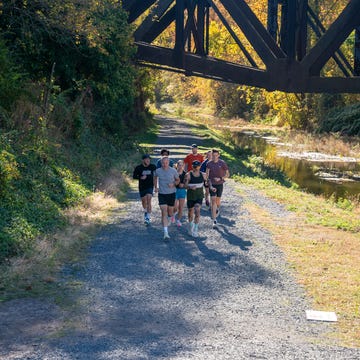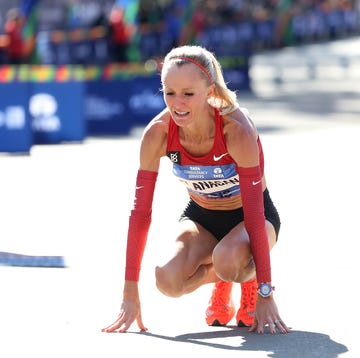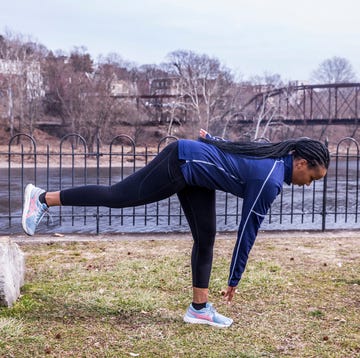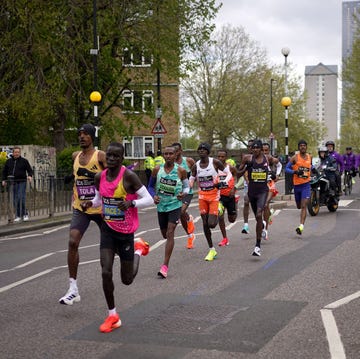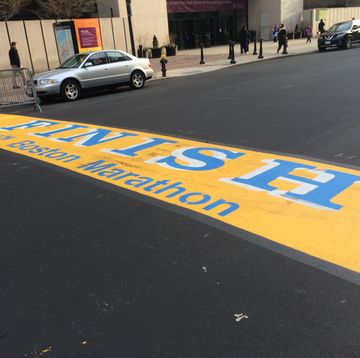Exercise is supposed to make us healthier and, for the most part, that's what it does. But there are some medical conditions, aside from injury, that you're more likely to experience if you're fit. One of those is dizziness and fainting when rising suddenly from a lying position to standing. The medical term for this is exercise associated postural hypotension, or EAPH, and it's common.
The classic example occurs at night, when a competitive runner, triathlete, or other hyper-fit person gets up to visit the bathroom. After a couple of steps, a wave of dizziness strikes and the sufferer may sway and experience dimming vision and buzzing in the ears. You may even black out briefly. Generally, the episode passes in a few seconds with no lingering effects except, naturally, concern about whether what just happened indicates a potentially serious underlying medical condition.
If this has ever happened to you, relax. It doesn't mean you're sick or hurt. Far from it, in fact. Spells of sudden dizziness on standing are actually a common side effect of high cardiovascular fitness, especially having a low resting heart rate. Many competitive runners have resting heart rates of 40 to 50 beats per minute, significantly fewer than the normal 60 to 100. That's not usually a problem, but it is a cause of EAPH.
When you're lying in bed and your heart is beating only 40 times per minute, if you suddenly stand up, gravity causes blood to pool in your legs and your slowly beating heart takes slightly too long to get the blood back up to your brain. If you also have lower-than-average blood pressure—another common feature of competitive runners and other highly fit exercisers—this can exacerbate the problem.
The brain is extremely sensitive to oxygen starvation, so even momentary loss of oxygenated blood to the brain causes faintness. “It's one time that being athletic doesn't help you: in the middle of the night,” says Dr. Lewis Maharam, a New York sports medicine physician and former medical director of the New York City Marathon. “If you were less athletic and had a resting heart rate in the 80s, it would never happen.”
Not every competitive runner experiences EAPH, but many do. One study of ultramarathoners found 68 percent had significant drops in blood pressure when rising suddenly from lying down. If you are one of these people, a few simple measures will minimize episodes of fitness-induced orthostatic hypotension.
For one thing, don't let yourself get dry. “One of the issues that can cause this is dehydration,” says Dr. Timothy Miller, an orthopedic surgeon and the lead physician for the Endurance Medicine Team at Ohio State University's Wexner Medical Center. When your body is low on water, Miller explains, blood volume can decrease, which can lead to lower blood pressure and make you more susceptible to EAPH.
And be careful about standing up suddenly, especially from sleep. Instead, sit for a few seconds before rising to get a midnight glass of water or to visit the bathroom. If you do start to feel dizzy, try to avoid falling and possibly injuring yourself. “Just sit down on the floor to keep your body from passing out and hitting your head on the floor or something,” Miller advises.
EAPH usually passes quickly and quietly without harmful after-effects—other than sometimes causing affected runners to worry. But a similar condition called exercise associated collapse or EAC is potentially more serious, though not uncommon. “We see it very often at aid tents at the end of triathlons and 10Ks,” says Dr. Diana Heiman, associate professor of family medicine at East Tennessee State University.
What happens with EAC is that a runner crosses the finish line, stops, and often leans over with hands on knees. The key factor here is stopping. The lower legs are important for pumping blood to the upper body while running. When a runner suddenly stops moving his or her legs, it can produce low blood pressure and cause dizziness, sometimes accompanied by fainting. In some cases, Maharam says, this can happen to runners who significantly slow their pace. It's the most common cause of collapsing during or after a race. One study of collapsed marathoners found nearly two-thirds of the cases were caused by EAC.
EAC is usually remedied quickly by simply raising the legs of a collapsed runner. Avoiding it, in most cases, is equally simple: Don't stop at the finish line. Keep walking through the chute and for a few minutes afterward. That will ensure your lower legs keep pumping blood through the body while your system adjusts.
The bottom line on exercise-associated dizziness and fainting is that if a runner collapses during or just after a race, it is potentially a sign of a serious underlying medical condition and you should stop exercising until you are checked out. If it only happens hours or days later, it's probably nothing to worry about.


